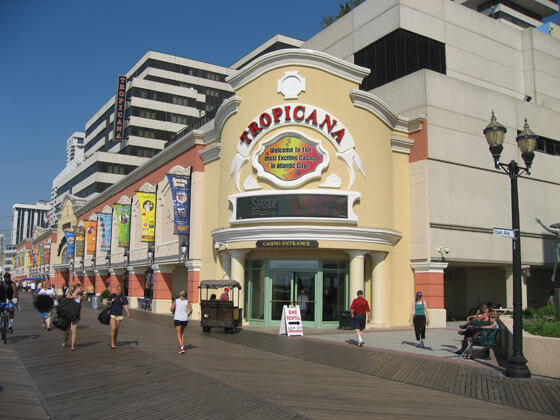Time magazine reported in October 2013, that casino gambling in America had reached the saturation point. Casino gambling is now available in 40 of the 50 states and many more are jumping at the ability to host their games online. The problem is that too many casinos are chasing too few gamblers in most parts of the country.
In addition, those gamblers are gambling a lot less than before. Time reports that slot revenues were down about 30% during 2014 from before. The peak of gambling revenues occurred in 2007 at $37.5 billion. Then the gambling revenues leveled off. In 2012, the annual gambling revenues were $37.3 billion.
Las Vegas
Las Vegas has weathered the storms of both boom and bust. According to Seeking Alpha, Las Vegas still captures 75% of the gambling market in the United States, with the three largest companies being the Las Vegas Sands Corp., Wynn Resorts Ltd., and MGM Resorts International, all with their headquarters in Las Vegas. Even though the number of visitors to Las Vegas has returned to pre-economic bust levels, the amount spent per person on gambling has declined. Las Vegas is making up the shortfall by gaining revenues from entertainment offerings.
Mississippi
Things are not going so well in Mississippi. The New York Times reported on the gambling glut in Mississippi. Two casinos of the dozen nontribal casinos closed during 2014, including the Harrah’s Tunica casino. It is very rare for a major casino, run by a sophisticated operator such as Harrah’s, to close.
Atlantic City
In Atlantic City, four of the twelve casinos closed during 2014. This will cause a huge budget gap of $3 billion for the state of New Jersey during 2015. According to Politico Pro this is tremendous trouble for New Jersey Gov. Chris Christie, who is making a bid to run for the President of the United States. The troubles in Atlantic City, with casinos such as Trump’s Taj Mahal going bankrupt and the closed Revel being up for sale, have given other states reason to question expansion of casino gambling operations.
Tax Revenue Projections Fall Short
Casinos in Pennsylvania represent the number two market after Las Vegas and now exceed the revenues of Atlantic City. Nevertheless, in reports by the Associated Press, the revenue projections from casino operations are falling short of projections in the states that most recently legalized casinos, which are Ohio, Maryland, and Pennsylvania.
-
Ohio
The biggest shortfall occurred in Ohio. Ohio legalized gambling in 2009 based on estimates from the Department of Taxation that Ohio would receive about $470 million to $643 million in additional annual tax revenues. The actual amount is closer to $267 million per year.
-
Maryland
In Maryland, tax revenues from casinos are also hundreds of millions of dollars lower than the projections made in 2008 by the Maryland Department of Legislative Services. The 2008 projections were that by 2013 the tax revenues would equal $1.36 billion per year. During 2014, the four operating casinos in Maryland generated only $833 million in tax revenues. Nevertheless, the tax revenues generated over the past five years were $2.3 billion, a windfall filling the state’s coffers. A sixth casino will open in Maryland during 2016. It is a $925 million construction project to build the MGM National Harbor hotel and casino in Maryland’s Prince George’s County. According to the Washington Post, more Maryland voters than before (38%) are now opposed to expansion of gambling in the state. Still, over one-half (53%) of Maryland voters approve of having casinos in the state.
-
Pennsylvania
In the success story of Pennsylvania, it took the addition of table games, allowed under new legislation that passed in 2010, to meet tax revenue projections. Only slot machines were originally planned and were the basis for the estimates made by the Pennsylvania Gaming Control Board, which projected $2.54 billion in annual tax revenues from slot machines. In 2014, the actual revenues from just slot machine play were $2.32 billion. When table games are added, the total tax revenues for 2014 equal $3.07 billion.
Competition Between States
Because of the close proximity between the states in the east, there is growing competition. The demise of Atlantic City is partially attributed to the casinos operating Baltimore, Maryland and other casinos in nearby states. Massachusetts and New York are planning casinos. State officials from those states are being careful not to over-estimate the potential new tax revenues generated.
Opposition to the expansion of gambling expresses the opinion that it represents unfair taxation on the population sectors who can least afford it. The counter-argument is that if the states do not offer legalized casinos, the state residents will simply travel to nearby states to gamble, causing the state to lose tax revenues to nearby states.
Good News for Regional Casinos
The most recent report in February 2015 from Money magazine is that casino revenues are up due to falling gas prices. Casinos in St. Louis, Connecticut, and those remaining open in Atlantic City all reported higher revenues in January 2015 than from the year before.
The Las Vegas Review Journal predicts that falling gas prices and rising consumer confidence will help regional casinos, making 2015 the best year since 2006.







